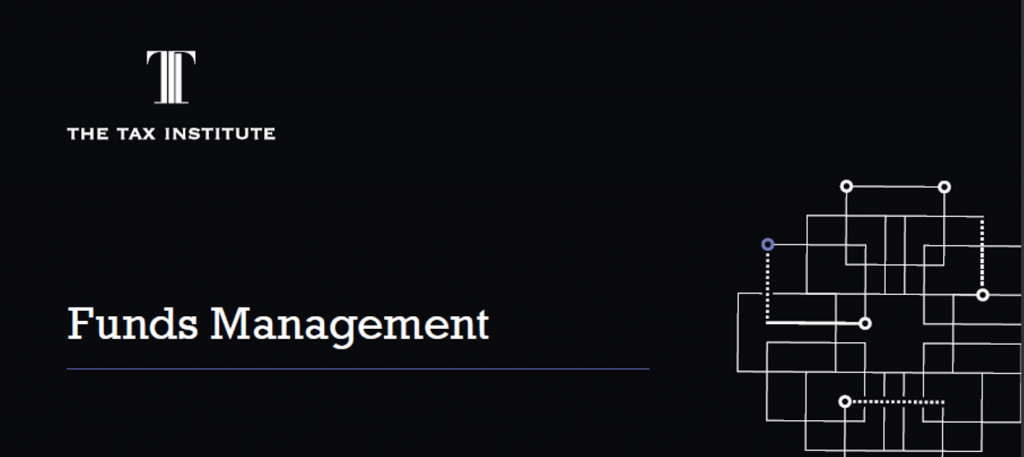The global funds management industry is experiencing a period of significant transformation. The industry in Australia is no exception.
The Tax Institute’s Funds Management seminar in April 2018 explored the key tax changes.
Led by a panel of expert presenters in the field of taxation of funds and asset management, the sessions in the seminar were constructed to provide an overview of the tax changes and an opportunity to discuss the practical application of the key reforms.
The papers from the event are now available on our website for individual purchase, or included free to access with a subscription to the Tax Knowledge eXchange. We highlight a selection of them in this post.
Asset management developments in tax: What’s new in the last year
Written by Jennifer Kwok, Director, Ernst & Young and Susan Spencer, Senior Manager, Ernst & Young, this paper provides a broad overview of the current state of tax developments in the asset management industry in Australia.
The paper includes a review of the current state of play benchmarked against the Johnson Report and stated policy objectives of the Government and a summary of recent case law, legislation, Australian Taxation Office guidance and other tax developments relevant to the asset management industry. The paper looks at:
- Central Management and Control Test
- RCF IV Decision
- Bare Trusts
- Significant Global Entities (“SGE”)
- Update on reporting requirements
- Listed Investment Companies and the impact of the corporate tax rate reduction
- Developments in relation to the Attribution Managed Investment Trust (“AMIT”) Regime
- TOFA Simplification
- Corporate Collective Investment Vehicles (“CCIV”) Regime
- Tax Incentives for Affordable Housing
- Foreign Resident Withholding Tax on Disposals of Property
The introduction of a range of multinational tax avoidance integrity rules highlights the Australian Government’s efforts to maintain the integrity of the Australian tax system by attempting to realign the taxation of multinational enterprises (MNEs) profits with the underlying economic substance of their operations (thus ensuring a “level playing field” for domestic and foreign taxpayers); and reflects public calls for greater transparency regarding where MNEs earn their profits and what tax they pay on those profits.
Whilst the introduction of additional multinational tax avoidance integrity rules represents a step forward in protecting the Australian tax base, these measures add significant complexities to cross border transactions and structures involving Australia. Despite the majority of the rules being primarily targeted at MNEs, non-MNE taxpayers (including Australian fund managers) may inadvertently be affected by the legislative amendments.
This paper, written by Pete Rhodes, Director, PwC and Ellie Jin, Senior Consultant, PwC, looks at the measures affecting all taxpayers, including transfer pricing and general anti-avoidance rules.
It then looks at the measures affecting significant global entities, including multinational anti-avoidance law, the diverted profits tax, Country-by-Country reporting, preparation of general purpose financial statements, and increased administrative penalties for significant global entities.
Finally, it looks at measures currently under development, including the hybrid mismatch rules and Multilateral Instrument.
Australian tax treatment of foreign investments by Australian collective investment vehicles
The purpose of this paper from James Tomlinson, ATI, Director, Ernst & Young, and Jessica Hall, CTA, Senior Manager, Ernst & Young, is to provide an overview of the current tax technical and practical challenges for Australian collective investment vehicles making foreign investments.
The aim of discussing some of these current tax technical and practical challenges for Australian outbound investors is to provide greater awareness and a general understanding of the Australian tax treatment of emerging foreign investment structures for Australian outbound investors.
As an overview, this paper discusses the common issues with outbound foreign investments including classifying investment vehicles under Australian taxation law, along with the relevant Australian tax treatment for entry, holding and exit of different structures. Furthermore, Australian outbound investors face operational challenges to align with the current and emerging guidance published by the Australian Taxation Office, given the investment returns and the Australian taxation treatment can take various forms.
Other papers presented at the event include:
Corporate collective investment vehicle (CCIV) regime - Peter Oliver, Partner, KPMG, Jamie Levy, Director, KPMG Law, Edward Tweddle, Manager, KPMG
The attribution MIT (AMIT) regime: Technical and practicalmatters to be considered - Grahame Roach, Tax Partner, PwC, and Samuel Lee, Tax Director, PwC









